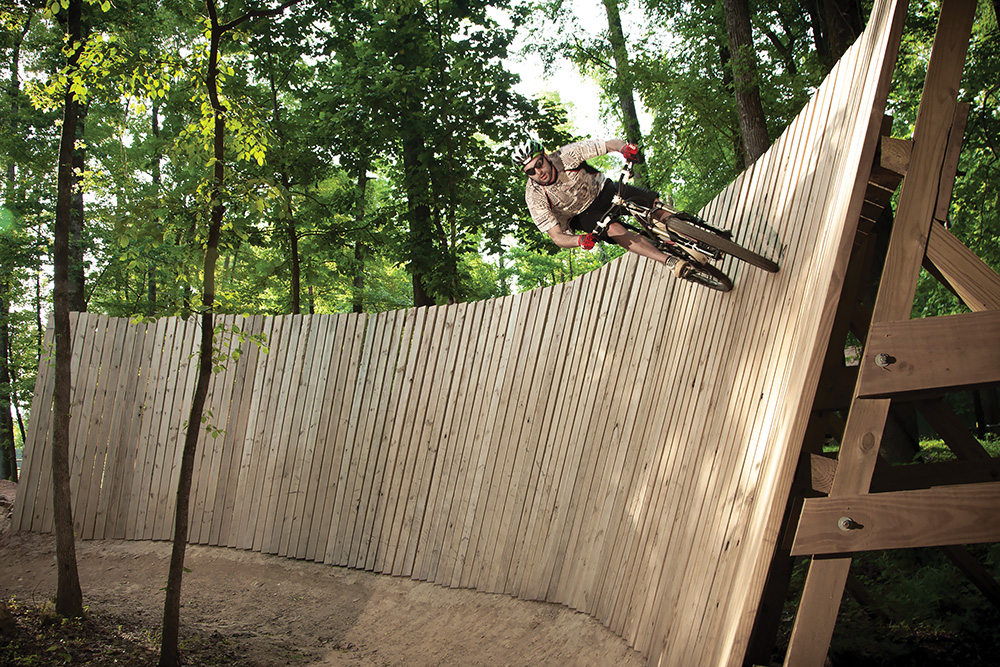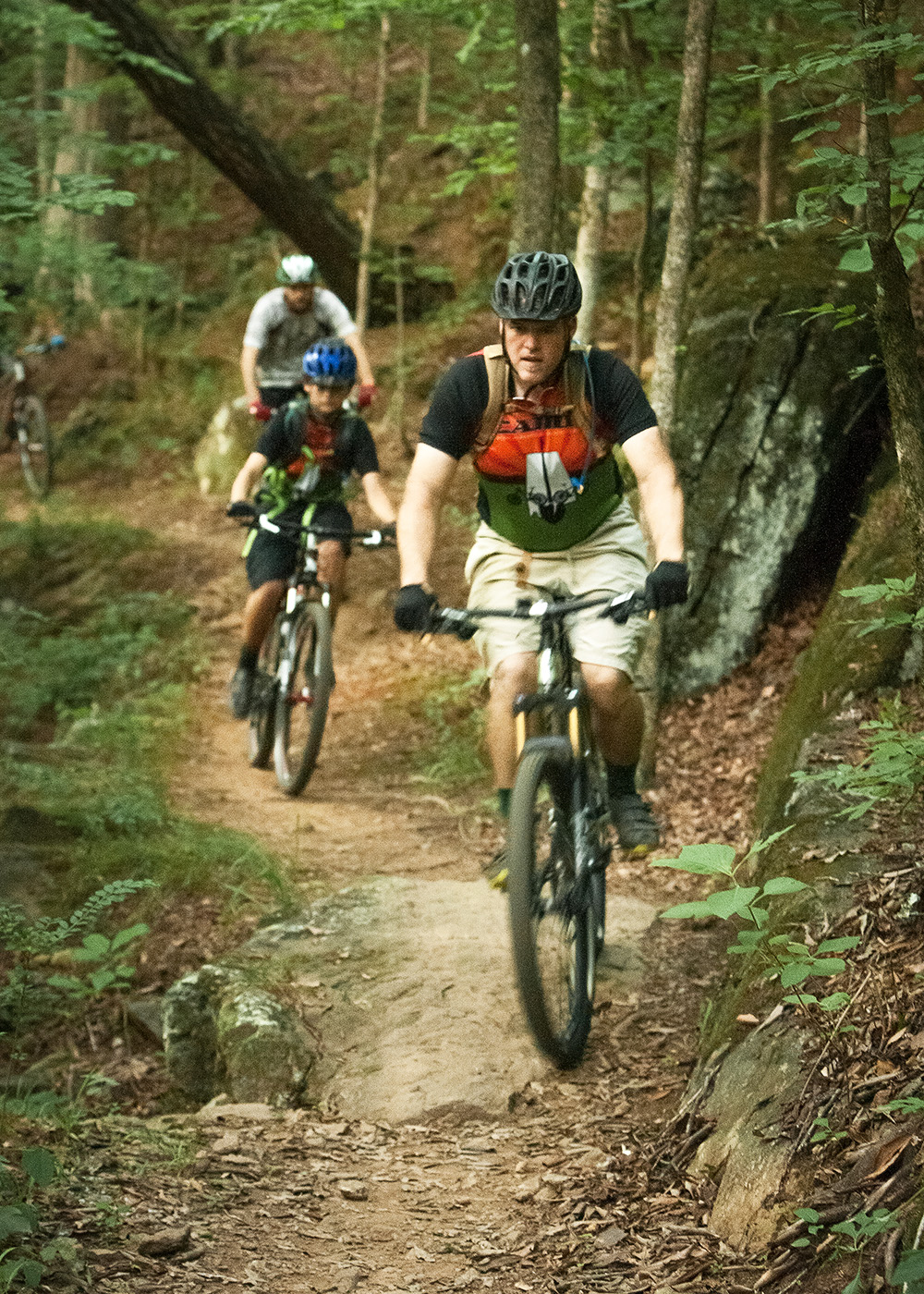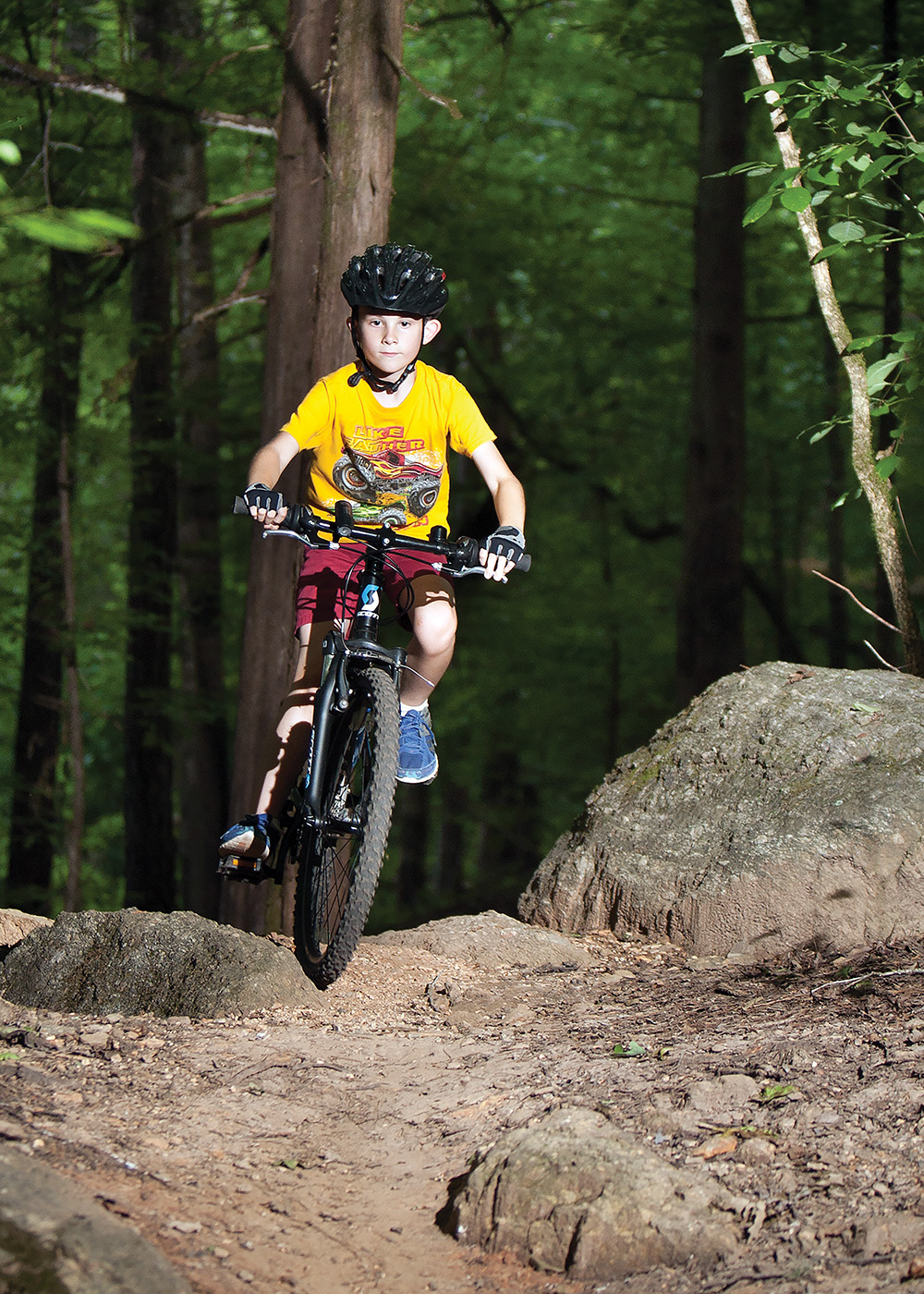Varied terrain makes Alabama a mountain biking destination
By John N. Felsher | Photos by Billy Pope, Alabama Department of Conservation and Natural Resources

Many Americans grew up riding bicycles as their primary form of independent transportation until they learned how to drive automobiles. In recent years, cycling enthusiasts have taken their sport to higher levels, literally and figuratively. Today, Alabama offers riders abundant trails running through terrain as varied as sandy beaches and mountaintops.
“When it comes to mountain biking, Alabama is a hidden gem,” says Philip Darden, manager of James Bros Bikes in Opelika and the Alabama representative on the Southern Off-Road Bicycle Association (SORBA) executive board. “The state really has a lot to offer bikers from beginner to expert levels. The quality of rides is exceptional. I’ve ridden many different trails and some of my favorites are right here in Alabama.”
In 1989, SORBA (sorba.org) formed to promote mountain biking and added regional chapters for cycling aficionados. Many association members periodically volunteer to build and maintain biking trails on public properties.
“I really encourage anyone who wants to try mountain biking to contact one of the riding associations,” suggests Mary Anne Swanstrom, president of SORBA-Huntsville (sorbahuntsville.org). “Mountain biking is not about speed. It’s about the experience and the camaraderie of riding with other people. I’ve seen children as young as three years old ride bikes that don’t even have pedals. The children push their way along.”

Learning to ride
People who want to try mountain biking shouldn’t buy the first cycle they see in a department store. People riding rugged mountain trails need strong equipment that can take abuse.
“There’s a big difference between riding a bicycle around the neighborhood and going on a mountain trail,” says Marcus Tillman, trail director for the Northeast Alabama Bicycle Association (neaba.net) and the Anniston recreation trails manager. “Quality mountain bicycles start at about $400 to $600. More advanced bikes might cost $1,000. I’ve even known people to pay $15,000 for a custom state-of-the-art bike.”
Writing a big check doesn’t necessarily put a rider on the correct seat. Like riders, bikes also come in varied sizes. Darden recommends visiting a bike shop to get the proper equipment specifically suited to one person.
“In the last few years, mountain biking equipment has really gotten much better,” Darden says. “A prospective mountain biker needs a bike that fits that person’s size. People at a bike shop know how to put a bike together for a specific person. A correctly sized bike is more enjoyable to ride.”
Besides the bike, a rider needs a good helmet, which might cost $40 to $60. Many experienced riders also recommend wearing full-fingered gloves with padded palms and comfortable biking shorts with chamois pads. A new cyclist might also buy a small backpack to hold valuables, snacks, cell phone, maps and other items while riding.
Even with the best equipment, someone who hasn’t ridden a bicycle in years should not immediately hit the toughest mountain trails. Start pedaling around the neighborhood to build up leg muscles and endurance while becoming familiar with the equipment. Then, ride an easy trail, perhaps one with a few small hills, and progress from there.
“Someone getting back into biking should ease into it and learn how to use the equipment properly,” Tillman says. “Riders need to become comfortable with when and how to shift gears properly. People also need to practice braking. Grabbing just the front brake is usually not a good idea. People need to learn how to use the rear brakes and feather the front brakes.”
All kinds of terrain
Fortunately, riders ranging in skill levels from beginner to expert can find many trails coursing through diverse habitat all across Alabama. Many city, county and state parks offer trails of varied lengths and degrees of difficulty. In addition, cyclists can ride trails through many national forest or Forever Wild properties.
The largest state park in Alabama, Oak Mountain sprawls across 9,940 acres just south of Birmingham. Cyclists at all skill levels can ride several trails. Experienced riders like the Double Oak Trail, also called the Red Trail, which runs approximately 22 miles through mountainous terrain. In 2010, the International Mountain Bicycling Association (IMBA) placed Oak Mountain on its list of Epic Rides, making it one of the “must ride” trails in the world.
Chewacla State Park south of Auburn offers riders more than 30 trail miles. Named for the Central Alabama Mountain Pedalers (www.camp-sorba.org) who helped build and maintain it, the CAMP Trail runs about a mile through relatively flat terrain around the campground. Other trails, like the eight-mile long For Pete’s Sake Trail, wander through rugged rocky terrain.
“As a former president of CAMP, I’m most familiar with Chewacla,” Darden says. “We want to build trails that are easily accessible so people can jump into the sport without any previous experience and feel comfortable riding. We also want riders to have opportunities to progress in their skill levels so they continue to grow as mountain bikers.”
CAMP and other volunteers worked to construct a dual slalom trail, the first of its kind in the state and unique to most of the Southeast. The Chewacla trail will host the Southeastern Collegiate Cycling Conference’s 2018 Mountain Bike Championship in early October.
The Coldwater Mountain Doug Ghee Nature Preserve and Recreation Area (www.alabamaforeverwild.com/coldwater-mountain) covers 4,183 acres of Forever Wild property in the foothills of the Appalachian Mountains by Anniston. Because of its status with the IMBA, people from surrounding states and even foreign countries frequently visit Coldwater Mountain, giving the Anniston area a tourism boost.
“The greater Anniston area has more than a hundred miles of trails,” Tillman confirms. “In terms of habitat, Alabama is one of the most varied states in the union, but the crown jewel is Coldwater Mountain. It has 37 miles of trails right now, but when we finish, it will have 70.”
The new Duck River Reservoir in Cullman just opened a 20-mile hiking and mountain biking trail that circles the entire lake. Susan Eller with the Cullman Economic Development Agency says it’s already attracted cyclists from across northern Alabama, and they intend to market it to local residents but also to create tourism dollars.
South of Anniston, Cheaha State Park offers incredible riding opportunities. Cheaha Mountain, the highest point in Alabama, reaches 2,413 feet. People can also bike through parts of the Talladega National Forest, including Coleman Lake Recreation Area north of Heflin.
In northern Alabama, many people ride the trails at Monte Sano State Park near Huntsville. In the fall, park visitors enjoy spectacular views of mountains emblazoned with colorful foliage. Riders can choose among 14 miles of trail that range from very easy to extremely difficult. The adjacent Monte Sano Land Trust Preserve offers another 20 trail miles.
“Northern Alabama has some wonderful bike trails,” Swanstrom says. “On Monte Sano, the terrain is rocky so people need to have some ability to ride the trails. Mountain biking is a wonderful way to enjoy nature and the mountain scenery while getting good exercise. It’s a very social sport, whether people just get out with a few friends to ride or they join hundreds of other people participating in an organized ride.”
Although lacking mountains, cyclists can still find ample cycling opportunities in southern Alabama. In Mobile County, Chickasabogue Park provides 17 miles of trails wandering through hardwood forests, sandy pine flats and over bridges crossing lowlands. In southeastern Alabama, Dothan coordinated with the Alabama State Lands Division to build a 319-acre park that features 10 miles of trails.
“The Dothan Forever Wild trails are multi-use, but their primary purpose is for mountain biking,” says Evan Lawrence with Alabama State Lands. “The terrain is somewhat flat, but the city added some features. The trails go through mixed hardwood and pine forests and cross Beaver Creek, which is very swampy.”
All over Alabama, cyclists can usually find a place to ride close to home with a quick internet search. For Alabama state park information, see www.alapark.com.





